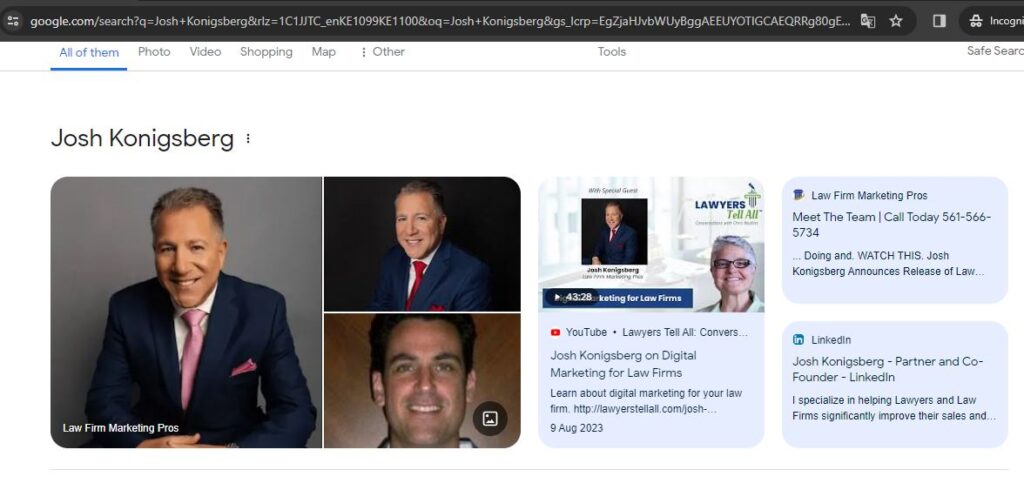Josh Konigsberg and I will discuss why making decisions based on marketing data is essential for your Law Firm’s growth.
But first, let me share my background and how I became interested in leveraging data for better business growth.
I’m an old-school search engine engineer, having laid the groundwork at Yahoo when it ruled the search landscape two and a half decades ago. Since then, I’ve been the analytical force behind the scenes, adapting to shifts like the rise of social media, evidenced by my involvement when Facebook opened its platform in 2007.
While others excel in salesmanship, I see myself as the mechanic, focused on the nuts and bolts of data rather than flashy presentations.
Growing up, I was introverted and struggled with English but excelled in math, finding solace and success in competitions. My fascination with computers led me to build my first website over thirty years ago, eventually earning contracts with major corporations like Raytheon. Through the years, I’ve worked with various big names, from American Airlines to Starbucks, leveraging data to inform decisions.
I relish the certainty of data, contrasting it with subjective assessments like those I faced in English class. While my English papers might have earned mediocre grades, my math prowess always yielded definitive results. I find comfort and excitement in the reliability of data-driven insights, where the answer is simply the answer, beyond debate or preference.
We had a shot at acquiring Facebook back when Mark Zuckerberg visited Yahoo. As the data guy, I crunched numbers to determine the value of a social network. In my youthful confidence, I believed we could craft our own platform rather than shell out billions for what a kid from Harvard had built. I’ve always been about building tangible systems, not just tossing around ideas.
While many colleagues pursued entrepreneurial ventures during my tenure at Yahoo, I stayed on, navigating through bureaucratic hurdles. Frustrated with endless meetings and bureaucratic red tape, I eventually left to pursue my own projects, like working with the Grameen Foundation and diving into performance marketing.
I thrive on diving into data, like in the recent case of assisting a client with their Google ads spending.
My expertise led CNN to invite me to discuss privacy and social media during the Cambridge Analytica scandal. Although it felt like a setup, I spoke candidly about the need for regulation and ethical considerations in tech.

Despite initial nerves and technical glitches during live TV appearances, I found my footing and even earned repeat invitations. While I understand the media’s tendency to angle stories, I maintain my integrity, refusing to be swayed by narratives that don’t align with the truth.
Why Making Decisions Based on Data Is Important for Law Firms
Let’s dive deeper into the weeds and uncover the nitty-gritty details of managing marketing systems and data. Imagine a tangled web of Google Ads, websites, custom-built platforms, CRMs, and more, each spitting out data faster than you can say “ROI.”
Now, corralling all this data into one coherent picture is like trying to lasso a tornado—it’s a wild ride, to say the least. But that’s just the beginning. In this chaotic landscape, different teams handle different slices of your marketing pie. Some are knee-deep in local SEO, while others are churning content like there’s no tomorrow. And amidst this frenzy, we’re drowning in a sea of metrics—how many blog posts did we churn out this month? How fast are we picking up the phone? But here’s the million-dollar question: how often do these metrics actually translate into cold, hard cash?
Sadly, it’s all too common for businesses to get lost in the numbers game, chasing after vanity metrics like a dog chasing its tail. Case in point: I once stumbled upon this so-called SEO guru who was charging an arm and a leg—$70k a month, can you believe it? But when I took a peek under the hood, all I found were glossary pages ranking for truck driving terms. Sure, they were hauling in traffic, but it was all folks looking to get behind the wheel, not folks looking for legal help after a fender bender.
So what’s the lesson here? Accountability, my friends. You must keep your marketing efforts to the fire and ensure they deliver the goods. No more blindly following the herd or getting bamboozled by fancy presentations. It’s time to roll up your sleeves and get down to business.
But let’s not forget about the unsung heroes—the folks behind the scenes making it all happen. Every agency has its rock stars, rookies, heavy hitters, and newbies. But hey, we all have to start somewhere, right?
Now, navigating this wild west of marketing systems and data is like trying to navigate a maze blindfolded. Nike does it with military precision, mapping out its brand presence across the globe. But for law firms, it’s more about the basics—intake systems, call tracking, the stuff that puts bread on the table.
But here’s the kicker: none of this means squat without solid data to back it up. That’s where tools like Agency Analytics come in handy. But even the fanciest tool in the shed won’t do you much good without a solid foundation of accurate, comprehensive data.
And let’s not even get started on attribution—tracking where the heck your leads are coming from. Traditional methods just don’t cut it anymore in this crazy digital age. That’s where lift testing comes in, separating the wheat from the chaff and showing you what’s really driving results.
Now, let me break it down for you: lift testing is like conducting a science experiment on your marketing efforts. You’re testing different variables to see what impact they have on your bottom line. Take, for instance, a PI firm in Wilmington, North Carolina. They’re running ads on Google and Facebook, but they want to know which channel is driving the most leads. So, they run a lift test, turning ads on and off in different markets to see what impact it has on their lead volume. It’s like playing detective, piecing together clues to uncover the truth behind your marketing efforts.
So there you have it, folks. Success in marketing isn’t just about the tools you use or the metrics you track. It’s about the people behind the scenes and the data guiding your decisions. So buckle up, buttercup—it’s gonna be a wild ride!
How to Win as a Law Firm in a Small Market
In a small market where there’s already a significant victory, I’d shamelessly promote that win. I’d share the story and then showcase it on the website and social media platforms. I’d invest a Dollar a Day targeting that neighborhood, leveraging platforms like Facebook, YouTube, Twitter, and others.
I believe this approach will generate more brand searches, thereby enhancing the effectiveness of local service ads (LSAs). In general, LSAs are immensely powerful for PIs. Those proficient in LSAs, as I’ve learned from interviewing them on my podcast, consider it an extension of SEO. This is because the ads are auto-generated and incorporate factors like reviews and response time, making it a comprehensive strategy.
Even if a larger law firm is present in the area, your storytelling approach signals authenticity, giving you an edge in the Google game. Unlike big law firms that often outsource to reputable but non-local agencies, your local presence allows for genuine connections with the community, evidenced by videos, images, and social media posts.
Google’s shift from E.A.T to E.E.A.T prioritizes experience over auto-generated AI content. Authentic content collected from cell phones, repurposed into blog posts, and shared across platforms reinforces your identity with Google. The goal isn’t to deceive but to showcase genuine experiences. Unlike the tactics of some who resort to generating thin, AI-driven content lacking in real-life experiences, your strategy is built on authenticity.
During my tenure at Yahoo, we focused on enhancing search experiences by penalizing spammy tactics. Many SEO practitioners may not view their tactics as spam, but attempts to manipulate search results are transparent. We’re equipped to identify techniques like triangular linking and auto-generated content.
Why Law Firms Should Own Their Marketing
Law Firms should have access to all marketing assets. If you’re a PI, ask to make sure you have admin on all your stuff, and watch the excuses come through. “Oh no, we gave you access to this dashboard that does everything together.” Like whatever, they won’t give you access to the actual Google ads or to WordPress, where you need to own all the assets.
My favorite thing to do in an audit is go to the Google or Facebook ads and click on the change history. And see, when was the last time anyone touched anything? Now there are auto-generated reports that these vendors will have because they have different tools that will put their vendor name on the thing and it’ll spit out the thing every week, or like ranking reports, especially SEO tools are really good at doing this sort of thing.
And it’ll send out all these reports, 20 pages long, this big export printed out, whatever it is, right? But what I’m looking for is if anyone actually did anything. What actions were taken? And is there an explanation from that vendor of why they built this page? Or why did they tune this ad? If there’s no explanation and no thoughtful analysis, then the odds are no work is happening, which is most of the time, or it’s very low-grade stuff like adding keywords, changing a few title tags, or doing some stuff that doesn’t really move the needle.
So there could be a lot of activity because the reports from Ahrefs, Majestic, Semrush, or whatever say, “Oh, we have these different errors going and fix these meta descriptions.” Okay, but how often is that really going to move the needle?
Then, agencies who welcome the audit know they’re doing good work and know the audit. It’s just, like, I’ll take an MRI and say, “You know what, Josh, it looks like you’re healthy. It looks like you’re not eating junk food, and it looks like you’re taking care of your body, and your triglycerides are healthy.”
That’s good. But most agencies, when we do that scan, the numbers aren’t very good and they’re trying to blame us. “Dude, we’re looking at your data. Why are you getting mad at me? It’s your data. You’ve just never seen it before.”
Ensuring That Law Firms Scale by Working With Certified Digital Marketers
We’ve established relationships with 700 universities, where they’re using our training programs. Teachers are mentoring these students, and they’re starting micro-agencies while still in school, which is far better than just reading a book and writing an essay. They’re actually applying what we teach, and I love seeing that. That’s why I speak at conferences like Josh Nelson’s seven-figure agency and others. Yesterday, I delivered a keynote address for my friends in Pakistan. It was virtual, but 5,000 people attended, and we’re training these individuals in Pakistan on how to do things the right way, according to our checklists, so they can pass the audit.

I want to create mentorship at scale so we have real measurement instead of people boasting about their achievements in the world of PI and digital. Let’s switch from voodoo to MRIs and actual data instead of relying on who talks the fastest, who has the biggest conference, or who appears to be the most successful. Let the data speak for itself. That’s my mission.
When I was six years old and being made fun of, I thought, “I’m going to prove these people wrong.” They seemed shinier, spoke better, and had better clothes. But I believed I could beat them because I had the right answers and was doing a better job. That’s why I root for people who aren’t as flashy but do good work, care about their clients, and care about growing a law firm correctly. They genuinely care about their reputation in the community, and I want to see those people win, not just the ones who talk the loudest or have the best TV commercials. There’s nothing wrong with that, but I want to let the good guys win by shedding light on the industry and training everyone, letting them see what’s in their Google Analytics, WordPress, etc. I love seeing that light bulb moment when people actually see their data for the first time.
The Future of Digital Marketing for Law Firms
In the digital realm, all channels are dismantled because they all operate on the same principle: the more users, the more ad revenue. Whether it’s Twitter, LinkedIn, YouTube, Facebook, or TikTok, they all follow this dynamic. Thus, whether it’s threads, YouTube, or Instagram reels, they all adhere to this advertising-supported growth model.
This pattern extends across various channels or networks, relying on ad-driven mechanics. This is why lawyers increasingly dominate billboards, as these principles apply universally across platforms. Despite this, many haven’t realized this pattern, though I’ve observed it for over a decade.
The three stages of the funnel—awareness, consideration, and conversion—are consistent across every network, be it LinkedIn or TikTok. Advertising and terminology remain consistent, whether search, social, or emerging AI-driven networks. Therefore, creating content that addresses these funnel stages allows coverage across all channels simultaneously.
Content isn’t tailored for specific platforms like YouTube or Instagram, but for the user, with repurposing across channels. Central to our teachings in 7 Figure training, this concept emphasizes the Content Factory model, where production, processing, and promotion are key stages.
As social media channels and AI tools proliferate, noise seems to increase. Yet fundamentally, little has changed; the principles remain constant.
Caring for customers reflected in reviews powers Local Service Ads (LSAs) and improved SEO. Documenting and processing these interactions for Google’s algorithms to recognize is crucial for visibility.
Take Josh Konigsberg (CEO, of Law Firm Marketing Pros), for example. He noticed a stub of a knowledge panel about himself on Google. This unexpected discovery came from his increased online presence through podcasts, speaking engagements, and press releases. But here’s the thing, Josh needs to claim and optimize his knowledge panel to fully leverage its potential. It’s about making sure every aspect of your digital presence works for you.

Similarly, clients should aim for comprehensive knowledge panels to dominate search results, enhancing their online presence and reputation.
Regarding automation, while artificial general intelligence (AGI) may be distant, universal basic income (UBI) and increased automation are imminent. This shift will occur rapidly, catching many off guard.
This acceleration is exemplified by AI’s progression from generating text to performing actions in everyday tasks, with unforeseen consequences akin to Jurassic Park scenarios.
Owning your marketing is paramount, as well as ensuring control and accountability across internal teams and vendors. Establishing clear metrics and data-driven accountability mechanisms minimizes errors and politics in the marketing process.
Looking to unlock your SEO potential? Visit AreYougoogleable.com now for a comprehensive SEO audit. It’s quick, effective, and essential—let’s go!
